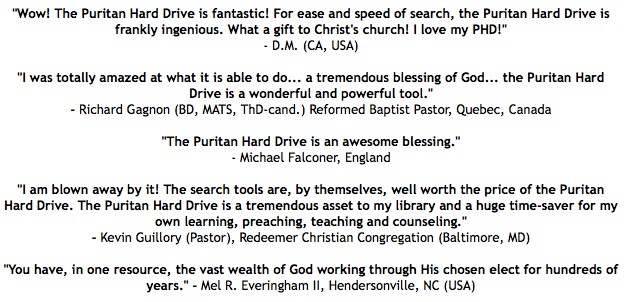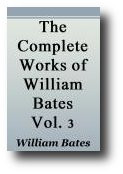 Loading... Please wait...
Loading... Please wait...Pastor Scott Brown, on the left in the video above, is the Director of the National Center for Family-Integrated Churches (NCFIC)
Resource Categories
- PURITAN HARD DRIVE REVIEWS
- PASTOR ROB VENTURA ON THE PURITAN HARD DRIVE
- DR. VODDIE BAUCHAM, JR. ON THE PURITAN HARD DRIVE
- R. C. SPROUL ON SWRB
- DR. JOEL R. BEEKE ON THE PURITAN HARD DRIVE
- PASTOR GREG L. PRICE ON THE PURITAN HARD DRIVE
- DR. MATTHEW MCMAHON ON THE PURITAN HARD DRIVE
- PASTOR SCOTT BROWN ON THE PURITAN HARD DRIVE
- PASTOR W. J. MENCAROW ON THE PURITAN HARD DRIVE
- JOAQUIN FERNANDEZ ON THE PURITAN HARD DRIVE
- PASTOR DAVID SILVERSIDES ON THE PURITAN HARD DRIVE
- JOHN HENDRYX ON THE PURITAN HARD DRIVE
- PASTOR KEVIN GUILLORY ON THE PURITAN HARD DRIVE
- RICHARD BENNETT ON THE PURITAN HARD DRIVE
- DR. KENNY RHODES ON THE PURITAN HARD DRIVE
- JUSTIN RAWSON ON THE PURITAN HARD DRIVE
- PASTOR JAMES WALLACE ON THE PURITAN HARD DRIVE
- PASTOR RICHARD GAGNON ON THE PURITAN HARD DRIVE
- PASTOR JOE HAYNES ON THE PURITAN HARD DRIVE
- DR. STEVEN DILDAY ON THE PURITAN HARD DRIVE
- PASTOR ANDREW COMPTON ON THE PURITAN HARD DRIVE
- TERENCE ELLARD ON THE PURITAN HARD DRIVE
- PASTOR JERRY JOHNSON ON THE PURITAN HARD DRIVE
- PASTOR DAVID PETRIE ON THE PURITAN HARD DRIVE
- JIM DODSON ON THE PURITAN HARD DRIVE
- PASTOR BRIAN SCHWERTLEY ON THE PURITAN HARD DRIVE
- PASTOR PHIL GIBSON ON THE PURITAN HARD DRIVE
- MEL R. EVERINGHAM II ON THE PURITAN HARD DRIVE
- PAUL BLYTH ON THE PURITAN HARD DRIVE
- STEVE KETTLER ON THE PURITAN HARD DRIVE
- D. M. (CALIFORNIA) ON THE PURITAN HARD DRIVE
- MICHAEL CAUGHRAN ON THE PURITAN HARD DRIVE
- WIILIAM NOPPER IV ON THE PURITAN HARD DRIVE
- LINDA THERIAULT ON THE PURITAN HARD DRIVE
- WILLIAM WARNOCK ON THE PURITAN HARD DRIVE
- ROBERT KOH ON THE PURITAN HARD DRIVE
- WHAT'S ON THE PURITAN HARD DRIVE?
- ALL PURITAN HARD DRIVE VIDEOS
- PHD-ODE INSTALLATION VIDEOS
- COMMENTS ON SWRB
- ALL PURITAN QUOTE VIDEOS
- PURITAN HARD DRIVE SCREENSHOTS
- PURITAN HARD DRIVE MINISTRY AND DONATION OFFERS
- TABLE OF RESOURCE CATEGORIES
- Advanced Studies
- SWRB SERMONAUDIO MOBILE APP
- Apologetics
- Assurance
- Attributes and Holiness of God
- Augustine
- Banner of Truth
- Baptism
- Beginners
- Bibles (Geneva, KJV, Hexapla, etc.)
- Biblical Counseling
- BIBLICAL HD COLLECTION
- Biblical Interpretation (Hermeneutics)
- Biographies and Autobiographies
- Calvinism and the Sovereignty of God
- CALVINISM HD COLLECTION
- CALVINIST CLASSICS HD COLLECTION
- Charles Spurgeon
- Children's Books
- CHRISTIAN EDUCATION HD COLLECTION
- Christian History
- Church Government
- Civil Government and Resistance
- CLASSIC CHRISTIAN HD COLLECTION
- Classic Puritan and Reformed Sets
- Commentaries
- Contemporary Issues
- Covenant Theology and Covenanting
- COVENANTER HD COLLECTION
- Covenanters and Covenanted Reformation
- Creation and Creationism
- Creeds, Confessions and Covenants
- Cults, False Religions, Psychology, Humanism
- Dealing with Affliction, Suffering, and Sickness
- Debates
- Dutch Reformed
- Education and Home Schooling
- English Puritans, Covenanters and Reformers
- Family, Children, Home, and Family Worship
- First Reformation
- Five Points of Calvinism (TULIP)
- For Pastors and Elders
- For Seminary Students
- FREE PURITAN & REFORMATION MP3 AUDIO SERMONS/BOOKS
- FREE PURITAN BOOKS, REFORMATION MP3s, PDFs, VIDEOs
- George Gillespie
- God's Law, The Ten Commandments, etc.
- Greg L. Price on Headcoverings
- Heaven, Hell and the Final Judgment
- Holy Days (Lord's Day, Christmas, Easter, etc.)
- HOME SCHOOL HD COLLECTION
- Intermediate Studies
- John Bunyan
- John Calvin
- John Knox
- John Owen
- Jonathan Edwards
- Justification
- Languages, Dictionaries, Reference, etc.
- LOOK WHO LOVES THE PURITAN HARD DRIVE
- Lord's Supper (Communion)
- Marriage, Courtship, etc.
- Martin Luther and Lutheranism
- Martyrs and Persecution
- Other Protestant Works
- Predestination and Providence
- PRESBYTERIAN HD COLLECTION
- Presbyterians and Presbyterianism
- Prophecy, Antichrist, and Eschatology
- PROTESTANT HD COLLECTION
- PSALM SINGING MP3s (COMPLETE SET)
- Psalters, Psalm Singing and Music
- Puritan Facts
- PURITAN FAST SERMONS (1640-1653) - 34 VOLS SET
- Puritan Fast Sermons 1640-1653
- PURITAN HARD DRIVE
- Puritans and Puritanism
- REFORMATION HD COLLECTION
- Reformation History
- Reformed and Puritan Classics
- Reformed Baptist
- REFORMED BAPTIST HD COLLECTION
- REFORMED HD COLLECTION
- REFORMED PRESBYTERIAN HD COLLECTION
- Reformed Presbytery, RPNA Protesters, etc.
- Reformed Theology
- Reformed Worship, The Regulative Principle, etc.
- Roman Catholicism, the Jesuits, Islam, etc.
- Salvation and Evangelism
- Samuel Rutherford
- Sanctification, Prayer and Holiness
- Scottish Covenanters
- Scottish Presbyterianism
- Scripture Song MP3s (Psalms and Bibles Verses)
- Second Reformation
- Separation, Unity, Uniformity, etc.
- Sermons and Sermon Collections
- Solemn League and Covenant
- Theology and Doctrine
- Third Reformation
- Thomas Watson
- Westminster Confession, Assembly and Divines
- Authors (All A to Z)
Phone Orders:
(780) 450-3730
To obtain free Reformation books, Puritan MP3s and Calvinistic videos, SWRB discount coupons, etc., add yourself to SWRB's Puritan and Reformed email list by using the form above.
The Complete Works of William Bates (Volume 3)
Resource Details
Resource Description
The Whole Works of the Rev. W. Bates, D.D. Arranged and Revised, With a Memoir of the Author, Copious Index and Table of Texts Illustrated.
Volume Three.
CONTENTS OF VOL. Three.
I. THE EVERLASTING REST OF THE SAINTS IN HEAVEN. Heb. 4. 9. There remaineth therefore a rest to the people of God. Introduction. The coherence of the words. The plan of the treatise
- CHAP. I. Description of the people .of God. They are His by election, special redemption, and renovation. They yield to Him voluntary and persevering obedience.
- CHAP. II. Heaven is the PLACE of this rest. Its stability, immensity, splendour, and pleasantness.
- CHAP. III. The EXCELLENCY of this rest. It is a holy rest. Sin is destroyed; temptations are excluded; holy duties are performed, and the soul possesses supernatural endowments.
- CHAP. IV. The second excellency of this rest. It is a joyful rest. The joy of holy men in this life arises from pardon, grace, and the hope of heaven. The joy of the glorified arises from exemption from toil, and afflictions of all sorts, and from the conquest of all enemies.
- CHAP. V. The subject continued. The joy of heaven arises from the conjunction of all the saints who are free from blemishes, united in blessed work, animated with perfect love.
- CHAP. VI. The subject continued. The joy of heaven corresponds with the majesty of God, and is proportioned to the love He bears to His people, and to the infinite value of the blood of Christ. The highest glory of heaven is the enjoyment of God.
- CHAP. VII. The third excellency of this rest. It is eternal. Because there is no change in God, and there shall be none in his people.
- CHAP. VIII. The love of God and the sufferings of Christ are the causes of bestowing this rest. In what sense it is a reward. The saints can claim no merit because God has an absolute right to our services; our spiritual powers are restored by free grace; our best actions are imperfect; they are of no advantage to God; and they bear no proportion to heaven.
- CHAP. IX. Proofs that this rest is reserved for the people of God from his immutability, justice, special love, and power. It is given after a life of service because that is most honourable to God, and most advantageous to the christian,
- CHAP. X. APPLICATION of the subject. The first use. How dreadful will be the future state of God's enemies. Causes of their present carnal security. They will be deprived of this rest. They will be in a state of positive misery. That misery will be eternal
- CHAP. XI. The second use. Learn the vanity of this world. It cannot afford true content. It will not be of permanent continuance
- CHAP. XII. The third use. The hope of this rest should fortify us against present afflictions, whether they be chastisements, or persecutions
- CHAP. XIII. The fourth use. This rest affords Consolation to the saints in their conflict with death. Why they must undergo this change. With what spirit they should meet death. The unwillingness of saints to die argues a defect in grace, and an inordinate attachment to the world.
- CHAP. XIV. The fifth use. The subject affords comfort in the death of holy friends
- CHAP. XV. The sixth use. Exhortation to prepare for this rest. General rules. To purify ourselves; arid to perfect holiness. Special rules. Choose this rest supremely; meditate upon it seriously; cherish earnest desires after it; strictly observe the sabbath
II. ON DlVINE MEDITATlON. Psalm 119.97. 0 how love I thy law! It is my meditation all the day.
- CHAP. I. The nature of meditation. It is speculative or practical; occasional or deliberate
- CHAP. II. The necessity of meditation. Disability, business, laziness, and sensual pleasures are hinderances to this duty
- CHAP. III. The time for meditation. How frequent? How long should it continue? Morning, night, and the sabbath, proper seasons
- CHAP. IV. The advantages of meditation. It improves the faculties of the soul, gives efficacy to ordinances, increases graces, brings comfort. and promotes holiness
- CHAP. V. Rules for managing meditation to advantage
- CHAP. VI. Use first of trial. The thoughts of a man indicate his character. The difference between voluntary and injected thoughts
- CHAP. VII. Use second of reproof. To carnal men for neglecting this duty. To regenerate men for omission, and remissness.
- CHAP. VIII. Use third of exhortation. The duty enforced by various arguments
- CHAP. IX. The foregoing rules exemplified in a meditation on the sufferings of Christ
III. ON THE FEAR OF GOD. Job 28.28. And unto man he said, behold the fear of the Lord, that is wisdom, and to depart from evil is understanding.
- CHAP. I. The nature of the fear of God
- CHAP. II. The objects of the fear of God
- CHAP. III. The difference between servile and filial fear
- CHAP. IV. The effects of filial fear
- CHAP. V. The consistency between the fear of God and other graces
- CHAP. VI. How threatenings and judgments should operate upon the fears of a Christian
- CHAP. VII. An exhortation to the fear of God
- CHAP. VIII. What heavenly wisdom is
- CHAP. IX. How the fear of God is wisdom
- CHAP. X. On the false wisdoms of this world
- CHAP. XI. The folly of worldly wise men in their pursuits
- CHAP. XII. Human knowledge insufficient to make a man wise
- CHAP. XIII. Mere speculation of divine truths also insufficient
- CHAP. XIV. Warning against hardness of heart, and presumption, which quench the fear of God
- CHAP. XV. On the evil of slavish fear
- CHAP. XVI. On the evil of superstitious fear
IV. THE FOUR LAST THINGS. Dedication to Lady Russell
ON DEATH. Heb. 2.15. And deliver them, who through fear of death were all their lifetime subject to bondage.
- CHAP. I. Proofs of Christ's deity. How the devil is said to have the power of death. An account of death's entrance into the world
- CHAP. II. What the fear of death includes. The passion of fear in general. The special causes that make death so fearful. The bondage of men from the fear of death. Reasons why men do not always feel this fear
- CHAP. III. How the death of Christ frees us from the tormenting fear of death. It redeems us from the curse, makes death a blessed advantage, frees the saints from afflictions, and obtains for them the highest positive good
- CHAP. IV. Why believers are subject to death since the sting of it is taken away. They die that sinful frailties may be abolished, that their graces may be exercised, and because the natural body is incapable of a celestial divine life. Their resurrection is delayed till the coming of Christ. Proofs of the certainty of their resurrection
- CHAP. V The qualifications of those who have a right to this privilege. Union with Christ is absolutely requisite. The Spirit is the bond of this union. He illuminates the understanding, inspires love to God, and communicates power to do the divine will
- CHAP. VI. Application of the subject. How great are our obligations to the Redeemer. It should be our great business to overcome the fear of death. Necessity of reconciliation with God. The danger of delaying repentance
- CHAP. VII. Application continued. The desperate hazard of trusting to sick-bed and death-bed repentances. Such instances very few, and extremely uncertain
- CHAP. VIII. Application concluded. Rules how death may be rendered comfortable. The duties of dying saints.
ON ETERNAL JUDGMENT. Acts 17.31. Because he hath appointed a day, in the which he will judge the world in righteousness, by that man whom he hath ordained; whereof he hath given assurance unto all men, in that he hath raised him from the dead.
- CHAP. I. The coherence of the text. Divine prerogative to judge the world. Qualifications of Christ for that office. Why the day of Judgment is called the great day
- CHAP. II. The equity of the divine law which will be the rule of judgment
- CHAP. III. The wisdom and justice of God in ordaining eternal death to be the punishment of sin
- CHAP. IV. The evidence of facts produced as the reason of judgment. The books will be opened, divine omniscience will give evidence, conscience will bear testimony, and numerous witnesses will appear. The impartiality of the sentence
- CHAP. V. Application of the subject. The certainty of a future judgment. It is a vindication of the proceedings of providence, a comfort to the saints under persecution, a restraint from secret sins, a remedy for sensual temptations, and a motive of terror to the wicked
- CHAP. VI. Application concluded. Preparatives for the last judgment. Faith in Christ. Sincere obedience. Self- examination. Improvement of talents. Zeal for the cause of Christ. Love to the saints
ON HEAVEN. Psalm 16.11. Thou wilt show me the path of life: in thy presence is fulness of joy; at thy right hand there are pleasures for evermore.
- CHAP. I. The divine presence is the felicity of the saints. The glory of the place described. The happiness of heaven illustrated by sensible representations CHAP. II. In heaven there is an exemption from all evils, and the enjoyment of all blessings,
- CHAP. III. The vision of God in heaven. His works and word, his decrees and counsels will be revealed to the blessed
- CHAP. IV. Effects of the vision of God. A glorious likeness. Humble veneration of His excellencies. Ardent love to Him
- CHAP. V. Union with God and its effects. Perfect knowledge. Pure love. Supreme joy
- CHAP. VI. Communion with saints and angels, The felicity of heaven is everlasting
- CHAP. VII. The felicity of heaven is not diminished by the number of its possessors. It continues for ever. The application. The woeful folly of sinners in refusing this happiness. It originates in the mercy of God, and is obtained by the obedience of Christ
- CHAP. VIII. The .qualifications of those who shall obtain heaven. The nature and necessity of regeneration, and sanctification
- CHAP. IX. The necessity of faith in Christ. We must choose heaven as our supreme happiness. This choice must be sincere
- CHAP. X. Our choice of heaven must be lasting. The properties of saving perseverance
- CHAP. XI. Directions how to fix our choice aright upon the felicity of heaven
- CHAP. XII. On the steadfast belief, and serious consideration of eternal realities
- CHAP. XIII. Objects which give vigour to the serious considerations of the soul, and determine it to choose heavenCHAP. XIV. Additional motives to encourage us to seek the kingdom of heaven
ON HELL. Mark 9.48. Where their worm dieth not, and the fire is not quenched
- CHAP. I. Exposition of the text. The dreadful nature of future punishment
- CHAP. II. The eternal duration of future punishment
- CHAP. III. Practical inferences. The mercy of God in salvation. The depravity of sinners. The wages of sin. Our infinite obligations to Jesus Christ.
All resources for sale on this website, with the exception of Scottish Metrical Psalms MP3s, are available on the Puritan Hard Drive .
VIDEO INTRODUCTION TO THE PURITAN HARD DRIVE


Phone Orders:
(780) 450-3730
To obtain free Reformation books, Puritan MP3s and Calvinistic videos, SWRB discount coupons, etc., add yourself to SWRB's Puritan and Reformed email list by using the form above.








































